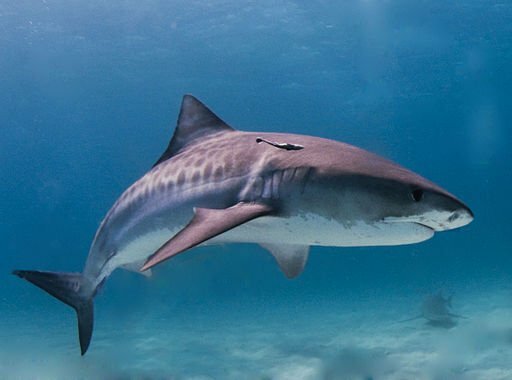A big shark was found on a beach in Ireland by a tourist from Switzerland. It was 14 feet (4.2 metres) long and scientists think it’s a type of shark that’s very rare in Ireland. The tourist sent photos to a shark expert at Trinity College Dublin, who then went to the beach with his team to get samples from the shark. The scientists are trying to learn more about the shark, such as why it died and how it ended up in Ireland. They want to use this information to help protect sharks like this one. The shark is not dangerous to people, and scientists say there’s no record of it ever biting anyone. They’re a bit worried though, because another one of these sharks was found on the coast of England not long ago.
Original news source: Wexford shark: Swiss tourist finds 14ft sand tiger shark on Irish beach (BBC)
Listen
Slow
Normal
Fast
Group or Classroom Activities
Warm-up Activities:
– Picture Prompt
Instructions: Show the students a picture of a shark and ask them to describe what they see. Encourage them to use English words they already know or to ask questions if they don’t know the word. This will help build their vocabulary and confidence in speaking.
– Shark Quiz
Instructions: Create a simple quiz with questions about the article. For example: How long was the shark found on the beach? Who found the shark? What are scientists trying to learn about the shark? This activity will help the students practice reading comprehension and recall.
– Shark Research
Instructions: Divide the students into small groups and ask them to research a different type of shark. They should find information about the shark’s length, habitat, diet, and danger to humans. Then, as a class, each group can present their findings and the students can learn about different types of sharks. This activity will help the students practice research skills and build their knowledge of English vocabulary.
Comprehension Questions:
1. What did a tourist from Switzerland find on the beach in Ireland?
2. How long was the shark that was found on the beach?
3. Do scientists think this type of shark is common in Ireland?
4. Who did the tourist send photos of the shark to?
5. What did the scientists want to learn about the shark?
6. Why do scientists want to use this information?
7. Is the shark dangerous to people?
8. Were scientists worried when another one of these sharks was found on the coast of England?
Go to answers ⇩
Listen and Fill in the Gaps:
A big shark was found on a beach in (1)________ by a tourist from Switzerland. It was 14 feet (4.2 metres) long and scientists think it’s a type of shark that’s very (2)________ in Ireland. The tourist sent photos to a shark expert at (3)________ College Dublin, who then went to the beach with his team to get samples from the shark. The scientists are trying to learn more about the shark, such as why it died and how it ended up in (4)________. They want to use this information to help protect sharks like this one. The shark is not (5)________ to people, and scientists say there’s no record of it ever biting anyone. They’re a bit worried though, because another one of these sharks was found on the coast of (6)________ not long ago.
Go to answers ⇩
Discussion Questions:
Students can ask a partner these questions, or discuss them as a group.
1. Have you ever seen a shark before?
2. Do you like sharks or are you scared of them?
3. What do you think about the shark being found on the beach in Ireland?
4. Why do you think the scientists wanted to study the shark?
5. Do you think it’s important to protect sharks? Why or why not?
6. Have you ever visited Trinity College Dublin? What did you see there?
7. If you found a rare animal, who would you tell?
8. What do you think the scientists will do with the samples they took from the shark?
9. Do you think it’s strange that the same kind of shark was found in England too?
10. How do you think the shark ended up on the beach in Ireland?
11. Have you ever been to a beach in Ireland? What was it like?
12. Do you know any other types of animals that live in the ocean?
13. Would you like to be a scientist and study animals?
14. What other animals do you think need protecting?
15. Have you ever seen a shark in a movie or on TV? What happened?
Individual Activities
Vocabulary Meanings:
Match each word to its meaning.
Words:
1. shark
2. beach
3. tourist
4. Ireland
5. scientists
6. rare
7. samples
8. protect
Meanings:
A) A country in Europe
B) To keep something safe from harm
C) People who study things to learn more about them
D) A place near the sea where people can swim and play in the sand
E) A big fish with sharp teeth that lives in the ocean
F) Small parts taken from something to study or test
G) Someone who visits a place for fun or to see new things
H) Something that doesn’t happen very often or is not common.
Go to answers ⇩
Multiple Choice Questions:
1. Who found the big shark on the beach?
(a) A scientist from Dublin
(b) A tourist from Switzerland
(c) A local from Ireland
(d) A fisherman from England
2. How long was the big shark found on the beach?
(a) 12 feet (3.6 metres)
(b) 14 feet (4.2 metres)
(c) 16 feet (4.8 metres)
(d) 18 feet (5.4 metres)
3. Why did the tourist send photos of the shark to a shark expert?
(a) To show off their photography skills
(b) To identify the type of shark
(c) To ask for help with their research
(d) To share their exciting discovery
4. What is Trinity College Dublin known for?
(a) Its shark research
(b) Its beautiful beaches
(c) Its famous museums
(d) Its delicious food
5. Why are the scientists studying the shark found on the beach?
(a) To learn more about its habitat
(b) To find out why it died
(c) To study its diet
(d) To learn how to catch more sharks
6. Is the shark found on the beach dangerous to people?
(a) Yes, it’s very dangerous
(b) No, it’s not dangerous
(c) It depends on the situation
(d) Scientists don’t know yet
7. What are the scientists worried about regarding the shark found on the beach?
(a) It’s too rare to study
(b) It’s too dangerous to approach
(c) It’s not rare enough to protect
(d) Another one was found recently in England
8. What do the scientists hope to do with the information they learn about the shark?
(a) Sell it to other researchers
(b) Keep it a secret
(c) Use it to protect sharks like this one
(d) Create a new type of shark
Go to answers ⇩
True or False Questions:
1. A tourist found a big shark on a beach in Ireland.
2. The shark was 14 feet long.
3. Scientists think this type of shark is common in Ireland.
4. The tourist who found the shark is a shark expert.
5. The scientists took samples from the shark.
6. Scientists want to protect this type of shark.
7. This type of shark is dangerous to people.
8. Another shark like this one was found on the coast of Ireland.
Go to answers ⇩
Write a Summary:
Write a summary of this news article in two sentences.
Writing Questions:
Answer the following questions. Write as much as you can for each answer.
1. Who found a big shark on a beach in Ireland?
2. How long was the big shark that was found on the beach?
3. What did the tourist from Switzerland do when they found the shark?
4. Why are the scientists trying to learn more about the shark?
5. Is the shark dangerous to people?
Answers
Comprehension Question Answers:
1. What did a tourist from Switzerland find on the beach in Ireland?
Answer: The tourist found a big shark on the beach in Ireland.
2. How long was the shark that was found on the beach?
Answer: The shark was 14 feet (4.2 metres) long.
3. Do scientists think this type of shark is common in Ireland?
Answer: No, scientists think this type of shark is very rare in Ireland.
4. Who did the tourist send photos of the shark to?
Answer: The tourist sent photos of the shark to a shark expert at Trinity College Dublin.
5. What did the scientists want to learn about the shark?
Answer: The scientists wanted to learn why it died and how it ended up in Ireland.
6. Why do scientists want to use this information?
Answer: Scientists want to use this information to help protect other rare sharks.
7. Is the shark dangerous to people?
Answer: No, the shark is not dangerous to people.
8. Were scientists worried when another one of these sharks was found on the coast of England?
Answer: Yes, scientists were a bit worried when another one of these sharks was found on the coast of England not long ago.
Go back to questions ⇧
Listen and Fill in the Gaps Answers:
1. Ireland
2. rare
3. Trinity
4. Ireland
5. dangerous
6. England
Go back to questions ⇧
Vocabulary Meanings Answers:
1. shark
Answer: E) A big fish with sharp teeth that lives in the ocean
2. beach
Answer: D) A place near the sea where people can swim and play in the sand
3. tourist
Answer: G) Someone who visits a place for fun or to see new things
4. Ireland
Answer: A) A country in Europe
5. scientists
Answer: C) People who study things to learn more about them
6. rare
Answer: H) Something that doesn’t happen very often or is not common.
7. samples
Answer: F) Small parts taken from something to study or test
8. protect
Answer: B) To keep something safe from harm
Go back to questions ⇧
Multiple Choice Answers:
1. Who found the big shark on the beach?
Answer: (b) A tourist from Switzerland
2. How long was the big shark found on the beach?
Answer: (b) 14 feet (4.2 metres)
3. Why did the tourist send photos of the shark to a shark expert?
Answer: (b) To identify the type of shark
4. What is Trinity College Dublin known for?
Answer: (a) Its shark research
5. Why are the scientists studying the shark found on the beach?
Answer: (b) To find out why it died
6. Is the shark found on the beach dangerous to people?
Answer: (b) No, it’s not dangerous
7. What are the scientists worried about regarding the shark found on the beach?
Answer: (d) Another one was found recently in England
8. What do the scientists hope to do with the information they learn about the shark?
Answer: (c) Use it to protect sharks like this one
Go back to questions ⇧
True or False Answers:
1. A tourist found a big shark on a beach in Ireland.
Answer: True
2. The shark was 14 feet long.
Answer: True
3. Scientists think this type of shark is common in Ireland.
Answer: False
4. The tourist who found the shark is a shark expert.
Answer: False
5. The scientists took samples from the shark.
Answer: True
6. Scientists want to protect this type of shark.
Answer: True
7. This type of shark is dangerous to people.
Answer: False
8. Another shark like this one was found on the coast of Ireland.
Answer: False
Go back to questions ⇧















